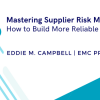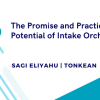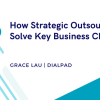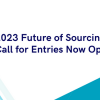At EcoVadis, we recently reached a major milestone on our road to improving sustainability and CSR performance across global supply chains — our 100,000th sustainability assessment. Since our first assessment in January 2008, we have collected data on more than 55,000 suppliers in 198 industries from 150 countries. Believe me, much has changed over the years.
As we look forward to our next 100,000 assessments, here is a look back at four things we’ve discovered.
Social purpose must be an integral piece of business models.
Previously, most corporations viewed responsible business practices as nice-to-haves and not need-to-haves. We have seen a shift, and now, more companies across the globe are emphasizing sustainability efforts and increasingly using the supply chain as the lever for improvement.
Whether it be the 10 principles of the United Nations Global Compact (UNGC) or the public statement from the 180 CEOs of the Business Roundtable, corporate commitments to strong sustainability and CSR management systems are becoming a mainstay of business operations — and they are paying off. Companies who proactively work with their suppliers reduce their overall risk and create more value, leading to a host of benefits from talent acquisition and retention to brand loyalty, valuation and sales.
Sustainability performance varies by region and across themes.
Data from this year’s Global CSR Risk and Performance Index indicates companies in Europe consistently outperform those in North America, Latin America and the Caribbean, Greater China and AMEA (Africa, Middle East and Asia excluding Greater China). Europe’s supply chain sustainability score has steadily improved over the years, and North America is beginning to catch up, with environmental, human rights and ethical issues gaining increased public attention.
Businesses in Latin America and Greater China are increasingly seeing authorities emphasize environmental inspections, anti-corruption measures and data protection legislations. This is a step in the right direction, but only a small part of what makes a strong CSR system.
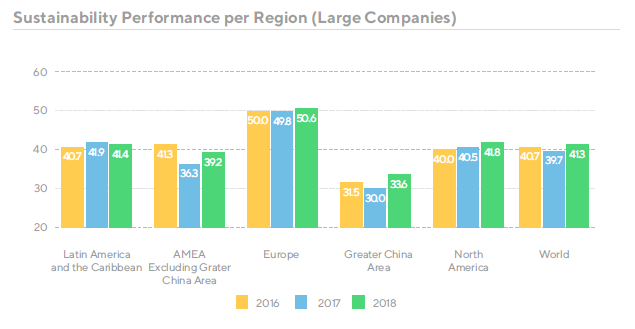
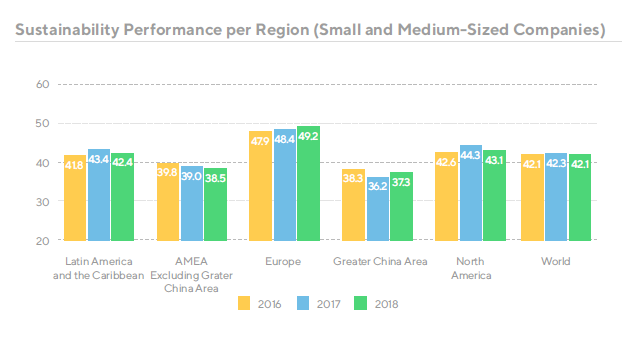
Source: EcoVadis Global CSR Risk and Performance Index
Globally, organizations are increasing their focus on the labor and human rights theme. We are observing better performance here year-over-year. As more countries introduce laws related to topics like modern slavery, supply chain transparency and disclosure, we predict this trend to continue. On the other hand, lack of progress in the sustainable procurement theme indicates existing vulnerability and limited visibility on tier-two and tier-three suppliers. This presents a greater likelihood of ramifications for complex supply chains in high-risk areas as was sadly illustrated in Delhi, India, when dozens of factory workers were killed in a devastating fire in December 2019.
Methodology must evolve along with the world.
As the world changes, so must the way we define and measure sustainability factors. We recently renamed one of our measurement categories from “Anti-discrimination and Anti-harassment” to “Diversity, Discrimination and Harassment” to create a more inclusive representation. As minority rights, gender equity and workplace behavior continue to become more important in everyday life, organizations must evaluate the practices and systems they have in place, internally and across their suppliers. Diversity, discrimination and harassment policies are not only important societal issues; they can severely damage a business’ reputation, thus impacting bottom lines.
We’ve also learned that it matters how you ask questions and the evidence you require. What else counts? Making it easy to get assessed, share your results and take concrete steps to improve. The proliferation of new sustainability and CSR standards across all industry sectors and countries is a positive reflection of the importance being given to sustainable management practices.
Yet, these changes can generate confusion among decision makers as definitions may vary.
Sustainable procurement is headed down the right path.
We’ve seen many businesses globally make critical improvements year-over-year on their overall CSR performance. When an organization commits to better sustainability practices, it makes a difference. Companies assessed multiple times typically score better in later assessments. This consistent improvement is one of the best takeaways from the past 100,000 assessments. The 2019 Global CSR Risk and Performance Index revealed that close to 60% of companies globally who were reassessed in 2018 improved their CSR performance. The purpose of assessments is to improve, and we’re seeing that play out every day.
Over the years, we’ve learned a great deal and it’s promising to see that no matter what changes, one fact remains the same — an organization drives change, increases business value and improves sustainability directly through its supply chain.
We’re excited for our next 100,000 assessments. It’ll be interesting to see where they take us and what they teach us.




